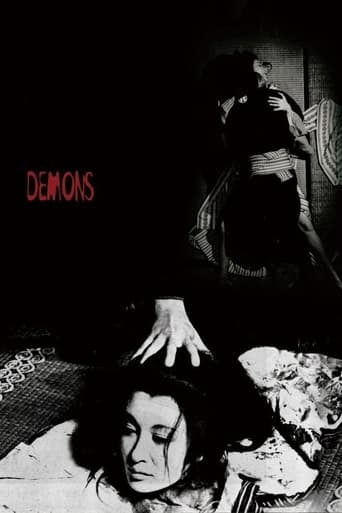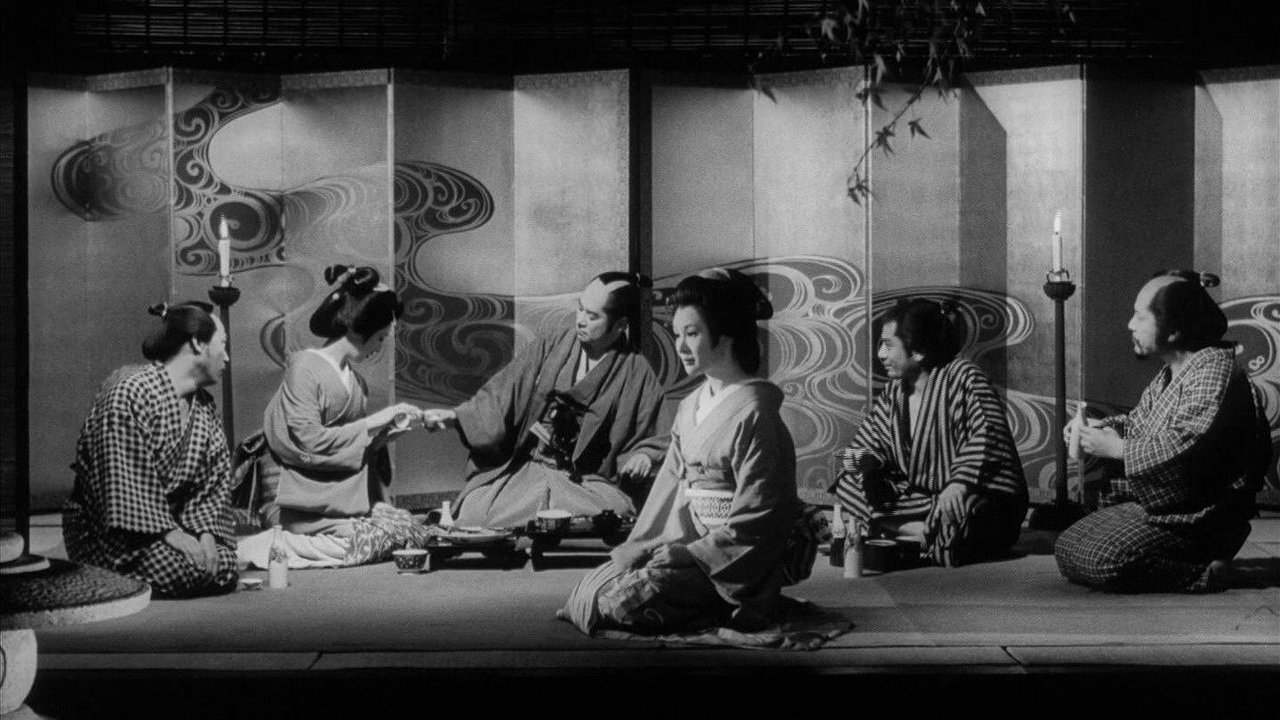hrkepler
'Shura' also known as 'Demons' or 'maybe even better known as 'Pandemonium' is second feature by great experimenter Toshio Matsumoto. It is one of the most experimental samurai films I have ever seen, and one of the most disturbing revenge stories. The film begins with colorful sun setting to transform into bleak black and white cinematography. After a geisha deceives a samurai and robs him together with her husband, the samurai starts the bloody and twisted path of revenge that unravels many secrets and treats the viewer with such twists that makes M. Night Shyamalan go green with jealousy. The film is cool mixture of classic samurai movies and film-noir with the tasty sauce of Matsumoto's experimental techniques. More straightforward and less surreal than the director's better known 'Funeral Parade of Roses'.
morrison-dylan-fan
Entering an exchange project on ICM,my first viewing was the distinctive rustic Comedy Ko to tamo peva. Getting introduced to Asia Cinema via the 2016 IMDb Film Festival board (RIP),I was thrilled to see that other title in the exchange program be an Asia title I've not heard of before!,which led to me unmasking the demons.The plot:Exiled out of his samurai clan, Gengobe starts a passionate love affair with geisha Komon. Given the opportunity to re-join his group, Gengobe receives a reinstatement payment. Being the first payment he has received since the exile,Gengobe is horrified to find that someone has stolen his cash,which leads to Gengobe unleashing his avenging demons.View on the film:Towering above everyone, Katsuo Nakamura gives an extraordinary expressive performance as Gengobe,with Nakamura's high standing and curled arms giving Gengobe a demonic appearance. Set against a stripped backdrop, Nakamura digs into the lack of Gengobe's remorse with a burning fury being cast across his face. Enticing Gengobe, Yasuko Sanjo gives an emotionally raw performance as Komon,whose darting eyes and broken screams haunt the film.Grown out of the stage play Kamikakete Sango Taisetsu,writer/director Toshio Matsumoto and cinematographer Tatsuo Suzuki pulls the horror to its most stark.The bare theatrical black and white backdrops are cut down with the sliver of swords and the spilling of Gengobe's revenge laying the demons across the screen. Staying close to the roots of Tsuruya Nanboku and Shuji Ishizawa's play,the screenplay by Toshio Matsumoto strikes the film with a brittle intimacy, which crackles with an atmosphere of engulfing darkness gripping the exchanges between Gengobe and Komon. Keeping the horror mood bubbling just under Gengobe, Matsumoto makes Gengobe's outbursts ones that sting with suffocating, merciless doom,as Komon sees the faces of Gengobe's demons.
Stijak91
If anyone imagined how a Greek tragedy would look if it was set in feudal Japan, look no further. It is a harrowing, exhausting, depressive experience, but it's worth it. The film follows a once great warrior, now a Ronin (for those unfamiliar, Ronin is a samurai without a master), named Gengobe, who has sold all of his property to repay his debts. He is in love with a geisha who is to be married to a rich lord, unless someone pays 100 Ryō for her liberty. Once he realizes that he was being played by this geisha and her husband, of whose existence he was unaware of, he becomes hell bent on revenge.The film emits a strange sense of reality distortion. The film begins with a dream sequence, that is somewhat foreshadowing of things to happen. This theme is prevalent throughout the film. We can see things unfolding, only to realize that it was just a thought, or a fantasy of a certain characters. Reality tends to be different, albeit sometimes it can lead to the same conclusion. What was particularly striking was the way the graphic scenes of violence were portrayed. They were slowed down, they almost feel other-wordly, yet these graphic scenes are strangely beautiful. Highly contrasted Black and white cinematography helps this, we see characters illuminated against dark background like phantoms and the black blood coming out of the wounds becomes even more noticeable.Shura is a tale of vengeance than leads all the parties involved into an abyss of some sort. There is no bright light at the end of the tunnel. Because of mere 100 Ryō, these people have turned into "Demons" and they're lives became "Hell". This film isn't disturbing because of its visual content, but because of its emotional impact. Gengobe isn't a typical hero, the reason why one would want to root for him is because he is an agent of justice (like Monte Cristo), but not because he himself is a virtuous hero worth rooting for. It's easy to hate most, if not all of the characters, but at the same time, it's difficult not to feet pity for them. Seldom comes a film that makes one feel this way.This film is not for everyone, it's extremely pessimistic, it doesn't offer glimmers of hope. It's not an easy watch, but it's worth it. I highly recommend it to anyone who is interested in film as an art form.
Last_Few_Days
A stark, desperate tale of vengeance, Shura examines the plight of Gengobe - a Ronin (Samurai without Master) - and his quest to right the wrongs done unto him. This is basically the whole plot in a nutshell, but this isn't any kind of action adventure story or pulp fiction Samurai epic, rather a philosophical and meditative examination of manipulation and a misguided affection which blinds a man from his duty and true quest. True this is a staple of Japanese cinema - but it is one which has rarely been examined quite this painfully and as unflinchingly as it is in this film.The theatrical origins of Matsumoto's film are very evident from the onset of this bleak piece, an extremely minimalist affair, but this only adds to the feeling of entrapment and claustrophobia. Daylight is glimpsed only once (the first shot as the sun sinks from the blood-red sky - also the only shot in colour) and the story plays out over the course of several nights.
As with his previous film 'Funeral Parade of Roses' Matsumoto employs many times a 'dual reality' device replaying scenes first as the protagonist imagines, and then as it actually happens, constantly keeping the viewer unsettled, with shocking - though never gratuitous - spurts of violence which one is torn between finding sympathy with and being repulsed by.This is a film which is easier to admire than to actually like, but it's forlorn, doomed and - literally - lightless vision means it could only be truthfully recommended to those who are fans of truly downbeat cinema. A viciously dark night of the Soul.9/10. 1 point deducted for not showing even the slightest glimmer of hope.


 AD
AD

